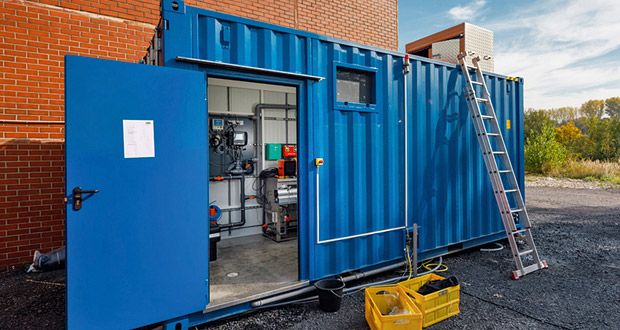RAG Aktiengesellschaft, Essen/Germany, tested methods for further reducing PCB in pit water at pilot facility level in Bergkamen and Ibbenbüren. The initial results from this series of tests are now available. The investigation into the PCB content takes place at the margin of detectability in the trace substance range. The analytical process being used here for the first time needs further development. At the same time, project manager Christoph Schabronath emphasises that: “The environmental quality standard for PCB in water is being adhered to at both the Haus Aden and Ibbenbüren sites.”
RAG broke new ground with this project and exceeded the legal requirements. Both the systems engineering and the analysis in the trace substance area were challenging. The task was to filter the smallest traces of PCB out of a large volume of pit water and to analyse it.
In North Rhine-Westphalia, RAG operated a pilot facility on container scale for removing PCB from pit water at the Haus Aden site, followed by Ibbenbüren (Figure 1). Further developed technologies and operating methods from drinking water preparation were used, i. e. single- and multi-layer filters made from quartz sand and anthracite coal in the pit water side stream.
Schabronath explains: “The pilot facility ran smoothly at both sites. However, the examination of the PCB content took place at the margin of detectability in the trace substance range.” Reliably determining such small traces of a substance and assessing the results is extremely challenging, and requires experience and a procedure adapted to the specific case at hand.
Due to the low concentration of PCB in the pit water, the results were unclear and it was not possible to eliminate uncertainty in the analysis. With such minimal traces, parallel investigations into the background presence of PCB in air and water are necessary.
At the end of 2019, an expert group consisting of ministries, authorities, surveyors and scientists met to assess these results. This group of experts also sees a need for further research. RAG has committed to further developing the analytical method within the framework of a doctorate in cooperation with the TH Georg Agricola University (THGA) in Bochum. (RAG/Si.)



